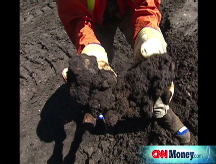Oil flat as gasoline supply grows
Investors weigh seasonal anomaly against big decline in crude stockpile and concern about Iran missile firings.
NEW YORK (CNNMoney.com) -- Crude prices settled flat on Wednesday, after seesawing bigger-than-expected gain in gasoline supplies countered geopolitical tensions after Iran test-fired nine ballistic missiles, a move considered a possible threat to the flow of Middle East oil.
Light sweet crude for August delivery settled up a penny to $136.05 a barrel in NYMEX trading. Oil was up 99 cents just before the release of the government's weekly inventory report, released mid-morning, and spiked directly after before pulling back.
The Energy Department said crude stocks fell by 5.9 million barrels during the week ended July 4. An consensus estimate of analysts from Platts, the energy analysis division of McGraw-Hill, predicted crude would fall by only 1.9 million barrels.
The crude draw was countered by a bigger-than-expected rise in gasoline supplies as pump prices hit records over the holiday weekend.
Gasoline. Gasoline inventories were up by 900,000 barrels for the week, nearly double the 500,000-barrel boost expected by Platts. Over the holiday, gasoline stocks usually decline or are flat.
The rise in supplies "implied demand for gasoline is tapering off," said Tom Orr, head of research for Weeden & Co.
"Refiners are probably getting worried of building up stocks... that consumers may not want to buy," said Rachel Ziemba, energy analyst with RGE Monitor.
The price of gasoline at the pump in the U.S. held steady Wednesday at a record $4.108 a gallon, according to a daily survey from motorist advocacy group AAA. Prices have maintained their record level since Monday.
Iran. Earlier in the day, crude futures were up as much as $2.24 as investors were set on edge by the Iranian missile test.
According to state-owned television, Iran launched nine long- and mid-range missiles as part of a war games exercise. Tests included the firing of a 1,200 mile-range Shahab-3 missile, which is purportedly capable of hitting targets inside Israel.
"Our finger is always on the trigger," said General Hossein Salami, commander of Iran's Revolutionary Guard on state TV.
The tests added to concerns over Iran's nuclear program and the possibility that the country could blockade the Strait of Hormuz, a vital waterway that carries a large percentage of the world's oil supply.
Rhetoric from Iran has been mixed over the past week, sending ripples through the oil market. "It's a three-ring circus over there," said Orr.
A week ago, Iran threatened to blockade the Strait of Hormuz if the country was attacked, sending oil higher. Iran tried to close the strait once before by laying sea mines during the Iran-Iraq war of the 1980s.
And crude prices slid more than $9 a barrel Monday and Tuesday after Iranian president Mahmoud Ahmadinejad eases tensions by saying he did not expect a future armed conflict with Israel or the United States.
The threat of reduced production from Iran, the second-largest producing member of the Organization of Petroleum Exporting Countries, along with a potential blockade of the Strait of Hormuz, gives Iran a powerful economic one-two punch, said Neal Dingman, senior energy analyst with Dahlman Rose & Co. ![]()



